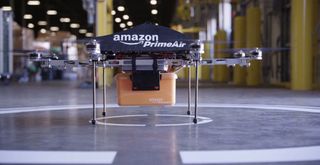Amazon's FAA Approval May Not Give Commercial Drones a Lift

After threatening to take its drone development abroad, Amazon got approval from the Federal Aviation Administration (FAA) this week to test its much-hyped Prime Air delivery drones on private property in the United States.
But this certificate might not be what Amazon had hoped for, and this latest development could spell bad news for the rest of the burgeoning commercial drone business.
"I view it as a setback for the industry," said Brendan Schulman, an attorney and expert in drone policy. "It signals that the FAA is requiring an experimental airworthiness certificate just to design and test drones. That, in my view, is not a viable path for innovation in this field." [5 Surprising Ways Drones Could Be Used in the Future]
Under the terms of the FAA certificate, Amazon drone operators will be able to test their aircraft during the day, up to an altitude of 400 feet (122 meters). The flying bots will always have to be within line-of-sight of the operator, who must have a private pilot's license.
The problem is that companies have been developing drones for decades without being subject to such rules, Schulman said.
"I've seen hundreds of amazing products designed without those certificates," Schulman told Live Science. "What the FAA is implicitly saying is that all those businesses need to stop what they're doing right now before even testing their products. Companies in this industry ought to be concerned with this approach."
Amazon CEO Jeff Bezos unveiled his vision for Prime Air in 2013, promising octocoptor drones that could deliver an online purchase in 30 minutes or less. But the company hasn't been able to get this service off the ground, as the drone industry has been stuck in legal limbo for years now. The FAA initially banned the commercial use of unmanned aerial systems, or UAS, (with a few exceptions) until regulators could draft a set of rules to govern the industry. The FAA put forth its long-awaited proposed set of regulations in February, though it came with some significant limitations. Namely, the rules require a person operating a drone to always be in sight of the aircraft, which, for now, would eliminate the possibility of using drones for deliveries.
Sign up for the Live Science daily newsletter now
Get the world’s most fascinating discoveries delivered straight to your inbox.
When those rules were announced, Paul Misener, Amazon's vice president for global policy, said the company was prepared to launch its Prime Air Service "where we have the regulatory support we need." In a letter to FAA regulators in December, Misener said that Amazon was already conducting outdoor tests of its delivery drones in countries "with regulatory environments more supportive" of drone innovation.
The FAA's proposal is still open to public comment for another month on the U.S. Federal Register, and it will likely take at least a year for any of the proposed regulations to become law.
Follow Megan Gannon on Twitter and Google+. Follow us @livescience, Facebook & Google+. Original article on Live Science.

